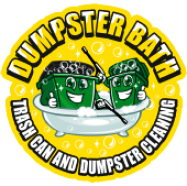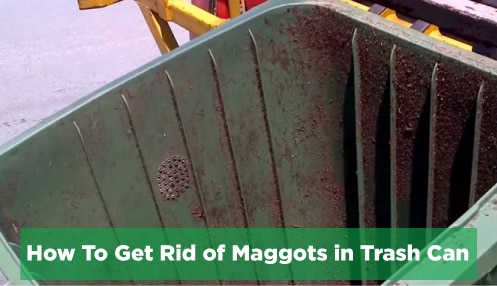Maggots in Trash Cans!
At Dumpster Bath, we know how frustrating it can be to find your trash cans or dumpsters full of maggots during the hot summer months. Many of our clients often ask us why maggots are attracted to trash cans and where they come from in the first place. To help you out, today we’re going to share with you everything you need to know about maggots in trash cans and some of the best ways to get rid of them if you experience these in your home or workplace.
Where do Maggots Come From?
Before discovering why maggots are so attracted to your trash cans, let’s take a look at where maggots come from in the first place. If you didn’t know, maggot is another word to describe larva, and when a fly lays its eggs, they then turn into maggots. It can often seem like hundreds of maggots appeared from nowhere when you have maggots in a garbage can, but you may just never have seen the eggs or flies around your trash. These flies lay hundreds of eggs at one time, which is why maggots appear in such huge quantities. The eggs hatch within just a few days, so it’s no surprise that maggots in trash cans appear to have come from nowhere. As a protective mother, the female fly will lay her eggs where she knows the maggots will be well-fed and safe. This is why your trash can is the perfect setup for the maggots to begin their lives.
Why Are Maggots Found in Trash Cans?
If you’ve found maggots in your trash cans, the good news is that this is a very common issue that can easily be resolved with our assistance. Maggots can appear at any time of the year, but they are more prevalent in the hot summer months, as the humidity and high temperatures offer them the ideal conditions to live in. Your garbage often rots a lot quicker in hot weather, and the smell attracts the maggots in large quantities. Rotting food and other waste material produce methane, a gas to which flies are particularly attracted. From there, they’ll go ahead and lay their eggs, which, as we explained, is how maggots appear. As soon as the larvae hatch, they have a source of food readily available for them in your garbage can. Within no time at all, homeowners and business owners often find their trash cans and dumpsters are fully infested with maggots and flies, making it impossible to continue to use these trash disposal units.
Are Maggots Flies?
As we shared earlier, maggot is used to describe larva, and then after the pupal stage, the maggots will turn into flies. As flies are so attracted to food and other trash, you’ll likely witness all of the maggot life stages if you monitor your trash cans carefully for a while. The main reason you will have issues with maggots within your home or business is that you allow flies to get into your waste, whether that’s through holes in your trash cans or leaving the lid off your dumpster. It’s not hard for flies to find their way into dumpsters, which is why this is such a common issue. Even just a small gap or crack in your trash can makes it easy for a fly to slip through, and in no time at all, they’ll lay hundreds of eggs and leave you with a huge issue to deal with.
The Maggot Life Cycle
The maggot and fly life cycle follows a few stages, and this quick maggot life cycle is one of the top reasons for so many issues with maggot infestations. The quick life cycle and the huge quantity of eggs that are laid at one time is why so many homeowners find this issue keeps reappearing even after they’ve attempted to kill off the flies and maggots. This is the typical life cycle for maggots and flies:
- A female fly will live for around one month, during which she will lay between 500 and 2,000 eggs. These eggs are usually laid in batches of between 75 and 150 eggs.
- About a day after the eggs are laid, maggots will appear from these eggs.
- During this initial stage, maggots are usually between 3 and 9 mm long, and they will appear white in color. However, you may even find maggots that measure up to 20 mm, which are certainly quite a sight to see in your trash can.
- The maggots continue to feed for around three to five days.
- For the next 14 to 36 days, they will go through the larval and pupal stages and then transform into flies.
Ways to Prevent Maggots in Trash Cans
While it’s impossible to predict whether you’ll get maggots in your trash cans this summer, there are certain things you can do to try and minimize the risk of this happening. Maggots are attracted to meat in particular, so this is something to bear in mind when you are disposing of these leftovers. This could also include pet food or dead animals, as they aren’t fussy about the type of meat they consume. We encourage you always to clean up any food in your home and never leave it sitting out on the side. When it comes to placing it in the trash can, make sure you tie up bags very tightly so that maggots can’t make their way into your trash bags. Remove your trash bags from your house as often as possible to avoid this issue also occurring within the trash cans inside your home.
Cleaning your garbage cans regularly is something our team at Dumpster Bath can assist you with, and for homeowners and business owners, we recommend doing this often. You’ll want to ensure that whenever you use your garbage can, you always close the lid properly so that nothing can get in. If you are composting in your garden, also keep this properly sealed. Look out for any holes in your garbage can, as flies will sneak their way through, and this is how maggots in trash cans appear in the first place. If you do find you have maggots in your garbage can, make sure you get assistance with this issue as soon as possible to avoid it getting out of hand.
How to Get Rid of Maggots in Trash Cans and Dumpsters
When it comes to dealing with a maggot infestation, the easiest way to begin the process is to wait for your trash to be collected. It’s much easier to kill the maggots when you don’t have a huge mountain of trash in the garbage can. If you don’t bother cleaning the trash can after you kill the maggots off, you’ll find that within a few days, the whole process begins again. To kill the maggots, we recommend using boiling water, which usually instantly kills maggots. However, this isn’t the end of the process, as with the short lifecycle of the fly that we described earlier, you’ll often find that they return within just a few days.
For this reason, once you’ve killed off the maggots, you’ll want to clean out your trash can thoroughly. While you could do this yourself, we know this isn’t something that many individuals are keen to get involved with. Especially if you are dealing with large dumpsters at your office or workplace, you’ll want to call our team at Dumpster Bath to clean out your trash cans professionally. When you have clean and empty trash cans, you are much less likely to have a reinfestation following this cleaning process.
To avoid the flies and maggots returning in the future, we recommend that you line your smaller trash cans with large trash bags, which will catch any maggots should they reappear, and they’ll be collected and disposed of along with your trash. However, you’ll need to secure garbage bags to the can to avoid maggots in trash cans, which you can do with a heavy-duty elastic band. This will stop your trash liner from slipping down, which attracts the maggots in the first place. As you can see, this process doesn’t have to cost you a fortune, but it will get rid of the annoying maggots in garbage cans for good. Once you have killed off the maggots once, make sure you are keeping your trash cans clean and tidy to avoid this reoccurring, and next summer, keep an eye out for the problem happening again.
At Dumpster Bath, we specialize in washing trash cans and dumpsters of all shapes and sizes. Regardless of whether you are a homeowner or a business owner struggling with maggots in trash cans, we’ll be here to support you with cleaning up your trash cans following this incident. Instead of having to get your hands dirty and risk getting maggots all over you, the quick and easy way is to hand over this job to the professionals – call us at 931-557-3030 or visit our website at www.dumpsterbath.com to come clean trash can or dumpster today.


